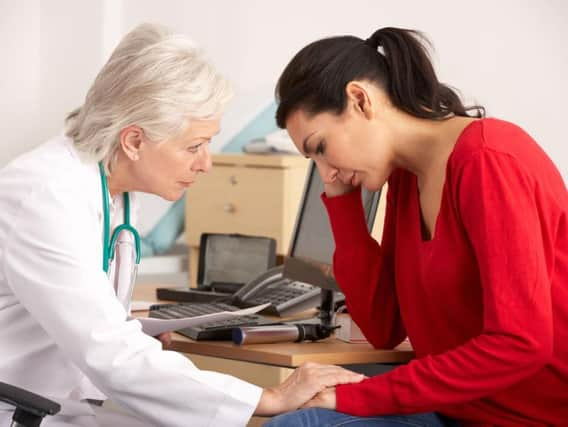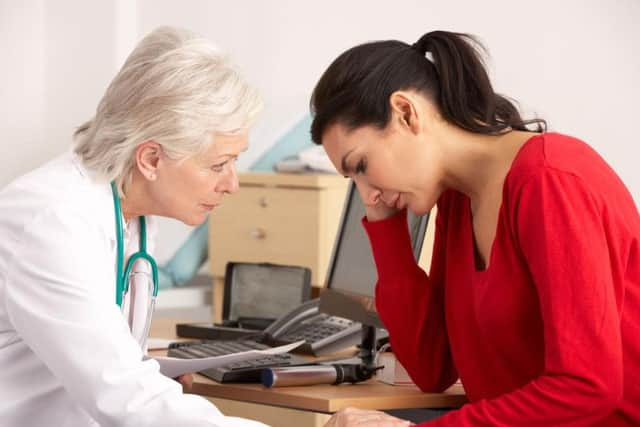Healthcare should be gender-specific, claims Leeds academic


The comments follow a report commissioned by Leeds City Council into the state of women’s health and wellbeing in the city, which raised issues around such areas as mental health, diabetes and addiction problems among Leeds’s female population.
The report’s author, Prof Alan White, told a meeting of the Leeds health and wellbeing board that the work he had done made him rethink everything he thought he knew about women’s health, and called on health providers to do more to take into account the different experiences of men and women.
Advertisement
Hide AdAdvertisement
Hide AdHe said: “We think we know women’s health, but we don’t know women’s health.


“This was a fantastic opportunity to delve into the issues facing women. When you look at these issues, you have to stand back and think very carefully about everything.
“The biology and social and cultural experiences of women are different from men. That impacts on their health and wellbeing, and their social place in society.”
“When you look at the impact of things like austerity, housing decisions and employment – you realise the narrative here.
Advertisement
Hide AdAdvertisement
Hide Ad“I talk about this report globally – I have spoken about it to the World Health organisation, I have spread this report around, and everybody is coming back and saying ‘wow, this is really important’.
“Once we think about how we make women safe and live longer lives, we realised that all the conversations you have had today should be gendered, because everything you’ve talked about differentially impacts women and men.”
The State of Women's Health in Leeds Report was published in March this year, following a comprehensive survey of women in the city.
Coun Rebecca Charlwood (Lab), the council’s executive member for health, wellbeing and adults, said: “We need to think about how we can commission services to women, but this report gives us a good sounding.”
Advertisement
Hide AdAdvertisement
Hide AdAlison Lowe, a charity chief executive and former Leeds City Councillor, added: “It’s brilliant. It is really important that we capture the voices of women who are not represented in this report too.
“The other thing is maternity services for lesbian women. It is about looking at experiences around LGBT.”
The report found that women were twice as likely to have a mental health problem as men, while smoking, drug and alcohol problems among the city’s females were higher than the national average.
Prof White added: “As soon as we start to look at the detail, we realise women have high rates of smoking, drug and alcohol abuse in Leeds, but there is a story about how they get addicted and how we help them come out of it.
Advertisement
Hide AdAdvertisement
Hide Ad“You have to think about how dementia, which is the biggest killer of women is a major health issue.
“We are seeing a decrease in lung cancer in men, but an increase in women. We have different impacts of screening, respiratory diseases, we have a lot of women with diabetes, which impacts on their complete health.”
The meeting was also told the number of girls who said they had experienced anxiety or depression was rising faster than the rate for boys.
As well as physical and mental health problems, the report also focussed on the safety of women in Leeds. It showed more than three quarters of those suffering from domestic violence in the city were female.
Advertisement
Hide AdAdvertisement
Hide AdProf White added: “Are women still scared to go out or to get a taxi? We have tried to give voice to what women are experiencing.
“We have to listen to women in the creation of services. We have to make society not more equal, but equal.”
The State of Women’s Health in Leeds Report looks in depth at some of the health issues facing women in the city.
It claims life is becoming “more complex” for women, and that many more young girls are facing mental health problems. It follows a study carried out by Leeds City Council and Leeds Beckett University, in association with the Women’s Lives Leeds network.
Advertisement
Hide AdAdvertisement
Hide AdIt stated twice as many women as men are recorded as having a common mental health disorder.
The report added that black women, asylum-seekers, refugees, and Gypsy and Traveller women have higher rates of common mental health issues and are less likely to receive mental health treatment.
Self-harm and eating disorders were more common in girls and women. However, twice as many women are accessing the IAPT mental health services as men.
There were also claims that women are more likely than men to become addicted to smoking, alcohol and drugs and find it harder to stop.
Advertisement
Hide AdAdvertisement
Hide AdAnd, while the number of Leeds women smoking is falling, the levels are higher than both regional and national averages. It added that just under 10 per cent of pregnant women smoke in Leeds.
Women from wealthier parts of the city tend to drink more, it added, but alcohol-related deaths were highest in poor areas.
The rates of women dying due to drugs and substance abuse has risen recently, with Leeds having higher rates than the national average. It added that lesbian, bisexual and trans women are more at risk of substance abuse.
City-wide obesity rates among women sit at just over seven per cent. However, in some parts of the city, the figure rises to 30 per cent, with a “strong link to poverty”. Women also have double the rate of hospital admissions for obesity treatment. The problem is the same at the other end, as more women than men have been diagnosed as underweight.
Advertisement
Hide AdAdvertisement
Hide AdWhen it comes to maternal health and motherhood, teenage contraception rates in Leeds are higher than the UK, but are in decline. There is, in fact, an increasing number of women in Leeds becoming pregnant over the age of 30.
The report added that there were nearly 3,000 abortions in Leeds during 2016, while 182 children died through miscarriage, stillbirth and the neonatal period. There were also an increasing number of home births.
Violence against women was still a problem in the city, as the report stated: “Across Leeds, 77 per cent of those reporting domestic violence are female and 21 per cent male – where a suspect was identified 26 per cent were female and 74 per cent were male.”
It recommended that more work needed to be done to make sure women are safe, and to ensure their quality of life and mental health is improved.
Advertisement
Hide AdAdvertisement
Hide AdIt summarised: “Many positive steps are being taken to improve women’s health and overall lives in Leeds, but too often women have poor health and live in difficult circumstances. This reflects pressures on communities in a fast changing world and a society not properly aware of the significant health challenges women face. This leaves many struggling with complex needs beyond the point where support should have been available.”
A recent report from Leeds City Council, which looked into the findings, stated: “What the study reveals is that despite the city taking very positive steps towards improving the health of women, there are still many whose health is poor and who are living in difficult circumstances. This requires a whole system approach to tackle these issues.”
It later concluded: “Leeds is the first city in the UK to produce a comprehensive picture of life, health and wellbeing for women and girls.
“There is a valuable opportunity to use the findings of the State of Women’s Health in Leeds report across the system to understand needs and commission and provide better services.
Advertisement
Hide AdAdvertisement
Hide Ad“This is will make a significant contribution to our Leeds Health and Wellbeing Strategy for Leeds to be a healthy and caring city for all ages, where people who are the poorest will improve their health the fastest.”
Leeds women’s health fact file
- Dementia is the single highest recorded reason for women dying.
- Cardiovascular disease in women is down by 27 per cent in the last 10 years.
- More than 3,000 females have type one and more than 16,000 type two diabetes.
Advertisement
Hide AdAdvertisement
Hide Ad- More than 150,000 women in Leeds have one or more long-term conditions and nearly 20,000 are very frail.
- Women over 65 have twice as many emergency admissions due to a fall as men.
- Women have higher rates of sexually transmitted disease, but there is improved effectiveness in targeting those most at risk.